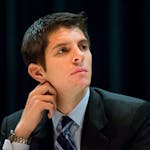“All human beings are born free and equal in dignity and rights,” states the Universal Declaration of Human Rights, adopted in 1948. Although progress has been made since then, much work remains to advance human rights for all, including LGBTI people.
Today, more than one-third of the world’s countries still criminalize same-sex relationships. These laws put millions of people at risk of blackmail, arrest, and imprisonment – and in up to 12 countries, possibly the death penalty. Around the world, lesbian, gay, trans, bisexual, and intersex persons are still subjected to hate and discrimination for being who they are.
In the face of this prejudice, the United Nations has spearheaded efforts to promote the equal rights and fair treatment of LGBTI people everywhere. One example is the UN Human Rights Council’s approval of a UN Independent Expert on Protection against Violence and Discrimination Based on Sexual Orientation and Gender identity (IE-SOGI).
The Independent Expert serves as a global watchdog for LGBTI equality by conducting official country visits, engaging human rights defenders on the ground, issuing emergency communications, and reporting these findings and information to the UN. According to Jean Freedberg of the Human Rights Campaign and Ryan Kaminski of the UN Foundation, the mandate helps “ensure that LGBTQ rights remain in the international spotlight and are integrated into the portfolios of both public officials and diplomats.”
In honor of Pride Month, we recently sat down with Victor Madrigal-Borloz, the current independent expert, to discuss the current LGBTI human rights landscape and what advocates can do to help support UN efforts.
Kelli Meyer: What is the role of the UN Independent Expert on Sexual Identity and Gender Identity?
Victor Madrigal-Borloz: This is a function established by the Human Rights Council with a purpose of creating visibility on violence and discrimination based on sexual orientation and gender identity. It was created because of the concern of the international community of the harrowing levels of violence and discrimination to which lesbian, gay, trans, and bisexual persons are subjected to every day around the globe. The function of bringing visibility is coupled with that of providing advice to states.
KM: What do you see as the biggest obstacle to achieving LGBTI equality?
VMB: One of them is the existence of legislation that is contrary to human rights standards, and this relates also very much to the criminalization of same sex relations.
The second one is the existence of stigma. That is the perpetuation of false associations between a person’s identity and certain behavior considered to be undesirable or criminal.
And the third one is negation: The flat-out denial that LGTBI persons exist in a certain context or that violence and discrimination against them exists.
KM: Are there any recent developments that give you hope?
VMB: The eradication of violence and discrimination has made enormous strides in the last 40 years. We need to place this into context. Only a few decades ago, pathologization, that is considering that being gay or lesbian or trans was the norm, rather than the exception. As of today, we have seen the completion of the process of depathologization by the World Health Organization (WHO), whereby it’s no longer considered to be an illness, any form of sexual orientation or gender identity.
There are also enormous strides in terms of decriminalization. Over 50 countries have decriminalized in the last few decades. There are enormous strides and enormous movement that give hope. This is one of the issues that demonstrates that real social change is possible within a generation.
KM: What is the most important thing that allies can do in their communities to stand up for LGBTI human rights?
VMB: I think that there needs to be strongly held respect for communities and populations that are affected by somebody’s actions. There’s a principle that must be respected: Do nothing about me without me and do nothing about them without them. The idea is simple: When adopting actions that affect communities, populations, or peoples, you need to ensure that these communities, populations, or peoples are involved substantially in the process of design of the public policy, the strategy, or the legal reform process that is involved.
KM: In 2018 in Colorado, Jared Polis became the first-ever openly gay elected governor in the U.S. Recognizing political and legal contexts differ across regions, what advice would you give to LGBTI people interested in public service, civic engagement, or activism, whether in the U.S. or around the world?
VMB: That’s an easy question because it’s very important to understand that there is not such a thing as special LGTBI rights. There are human rights that are within a particular context because the person that is enjoying them or not happens to be LGBTI. It should be that those that want to take part in government feel enabled to do so.
There are some trailblazers, and it’s important we celebrate the first time that a lesbian woman gets elected, a trans-man or woman, a gay person, or intersex representation – we celebrate those instances because they mark first impressions. But normally the rule is anybody interested in participating actively in government should be empowered and able to do so without any hindrance.
Stay informed on the Independent Expert’s recent work, including his latest reports.



 View All Blog Posts
View All Blog Posts

